There are many search tools in Linux, and today we will mainly discuss two tools: locate and find.
01
Locate
1. Performance Overview
Queries the pre-built file index database on the system
/var/lib/mlocate/mlocate.db
Note: If this file is deleted, locate will not work. The database must be manually updated (updatedb), or the system must be restarted for locate to function again.
Relies on a pre-built index:
The index is built automatically during periods of low system activity (scheduled task /etc/cron.daily), and administrators can manually update the database (updatedb).
The index building process requires traversing the entire root file system, which is resource-intensive.
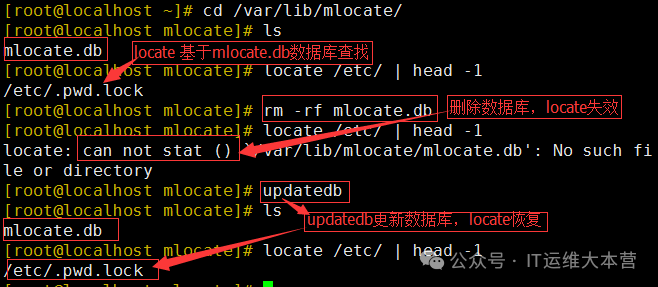
2. Working Characteristics
• Fast search speed
• Fuzzy search
• Non-real-time search
• Searches the full path of files, not just file names
• Only searches directories where the user has read and execute permissions; if permissions are lacking, results will not be displayed for security reasons, even if the database contains entries.
3. Usage of Locate
-i Case-insensitive search
-n # Only list the first # matching items
-r Supports regular expressions
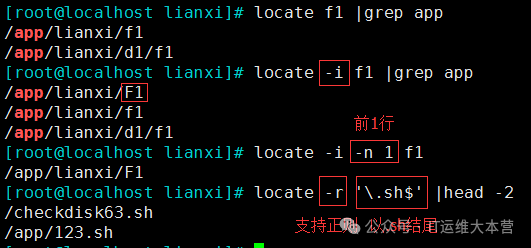
02
Find
A real-time search tool that completes file searches by traversing specified paths (find differs from other commands in that options are prefixed with a single -).
Compared to locate, find is much more powerful; in addition to searching by file name, it can also search based on permissions, file types, sizes, and many other criteria, making it widely used.
1. Working Characteristics
• Search speed is slightly slower
• Precise search (can achieve fuzzy queries through regular expressions and wildcards)
• Real-time search
• Only searches directories where the user has read and execute permissions
2. Usage Format of Find
find [OPTION]… [ search path] [ search criteria] [ action]
Search path: Specify the exact target path; defaults to the current directory
Search criteria: The specified search standards can include file name, size, type, permissions, etc.; defaults to finding all files in the specified path.
Action: Operations to perform on files that meet the criteria, default output to the screen, with many other processing actions available.
3. Search Criteria
① Search by Depth Level
-maxdepth level Maximum search directory depth, -1 specifies the directory as level 1, the current directory
-mindepth level Minimum search directory depth
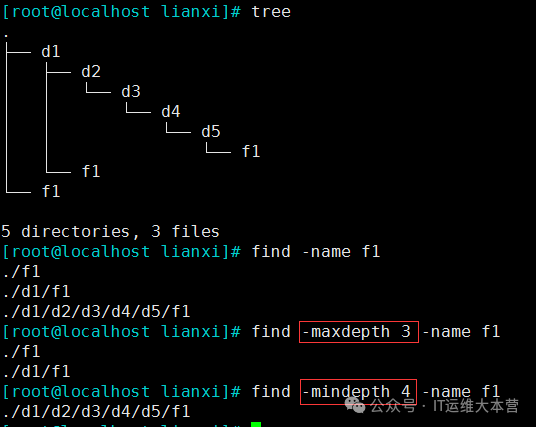
② Search by File Name and Inode:
-name: Exact search based on name, supports wildcard characters *, ?, [], [^], etc.
-iname: Case-insensitive exact search based on name
-inum: Search by inode
-samefile name: Search based on the same inode number (find hard links)
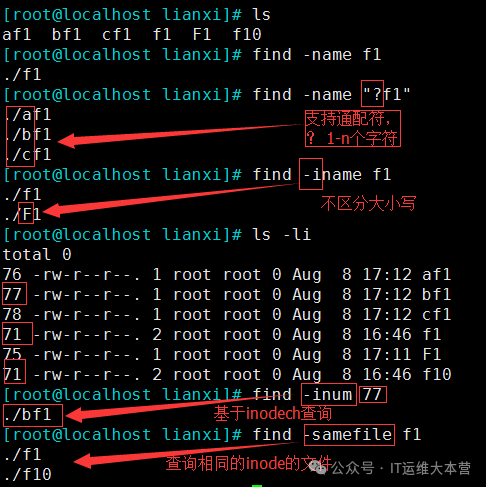
-links n: Files with n hard links
-regex “PATTERN”: Supports regular expressions, defaults to (emacs standard regex), queries the range expressed by the regex
Example: “.*\/ [a-z].*” searches for all files starting with a lowercase letter
-regextype egrep -regex supports egrep standard regex
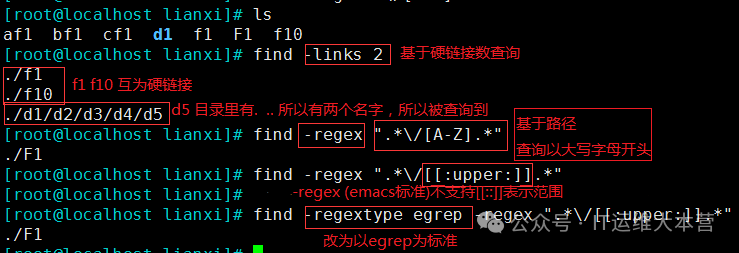
③ Search by Owner and Group:
-user USERNAME: Search for files owned by the specified user (UID)
-group GRPNAME: Search for files belonging to the specified group (GID)
-uid UserID: Search for files owned by the specified UID number
-gid GroupID: Search for files belonging to the specified GID number
-nouser: Search for files without an owner
-nogroup: Search for files without a group
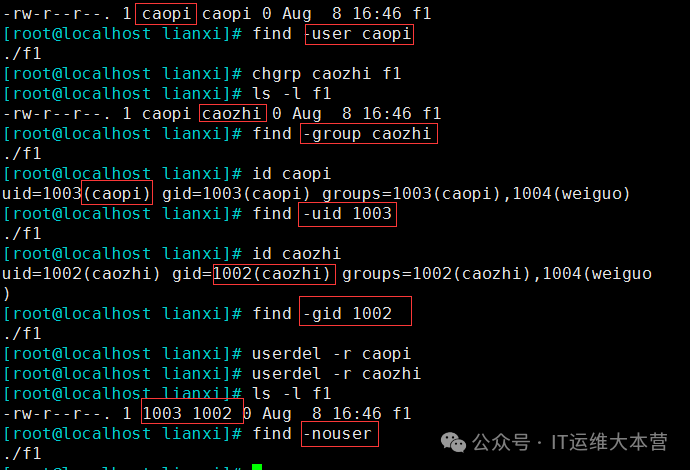
④ Search by File Type:
find -type
f: Regular filed: Directory filel: Symbolic link file (soft link)s: Socket file (/dev/log)b: Block device file (/dev/sda)c: Character device file (/dev/tty) p: Pipe file
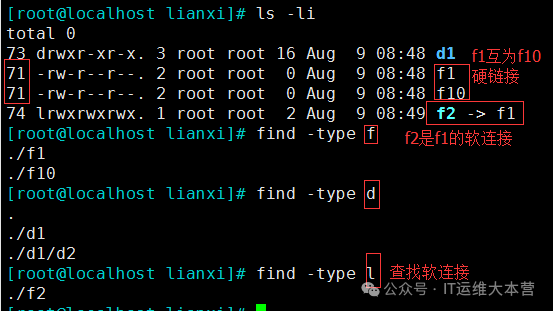
⑤ Search by File Size:
find -size [+|-]#UNIT Search by file size Common units: k, M, G, c (byte)
#UNIT: (#-1, #] For example: 6k means (5k,6k]
-#UNIT: [0,#-1] For example: -6k means [0,5k]
+#UNIT: (#,∞) For example: +6k means (6k,∞)
⑥ Search by Timestamp:
In “days”:
-atime [+|-]#, (access time)
#: [#,#+1) For example: 3 means [3,4)
+#: [#+1,∞] For example: +3 means [4,∞)
-#: [0,#) For example: -3 means [0,3)
-mtime (modification time) same usage as above
-ctime (metadata change time) same usage as above
In “minutes”: (same usage as above)
-amin -mmin -cmin
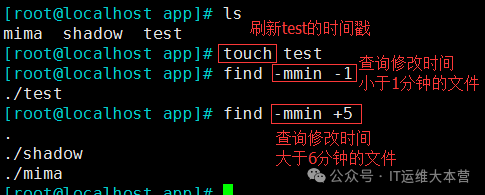
⑦ -perm Search by Permissions:
mode: Exact permission match
+mode[/mode] Any one of the types (u,g,o) must match at least one bit, or relation, + has been deprecated since CentOS 7
-mode Every type must have the specified permission simultaneously, with relation
0 means not concerned
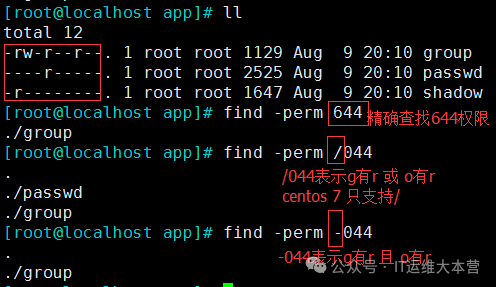
⑧ Combined Condition Search:
And: -a can be omitted Example: find -nouser [-a] -nogroup
Or: -o
Not: -not, !
De Morgan’s Laws:
(Not A) or (Not B) = Not(A and B) !A -o !B = !(A -a B)
(Not A) and (Not B) = Not(A or B) !A -a !B = !(A -o B)
4. Action Processing
-print Default
-delete Directly delete the found files without asking.
-ls Long list the found files, similar to ls -li
-fls file Long list the found files and import them into the specified file.
> file Import the query results into file >> file Append the query results to file
-ok command \; Execute the next command with the found files as parameters (interactive) (do not forget the last \; is a fixed format)
-exec command \; Execute the next command with the found files as parameters (non-interactive)
{ }: Used to reference the names of the found files themselves
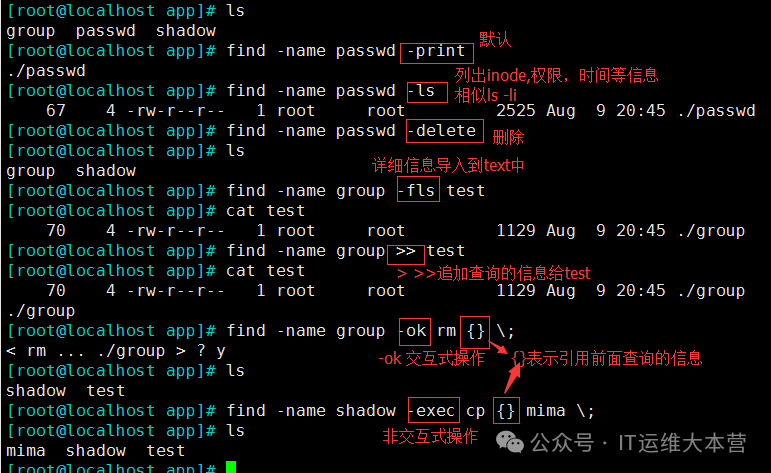
5. Processing Parameters with xargs (Universal Parameter Passing)
xargs is used to generate parameters for a command,
Purpose: Many commands do not support piping | to pass parameters, xargs can pass all parameters.
For example:find /etc/ -name “*.sh” | xargs ls -l
Some commands cannot accept too many parameters, and command execution may fail; xargs can solve this.
For example:touch, rm cannot execute more than a certain number of parameters at once (approximately 30000).
You can echo {1..30000} | xargs touch
Link: https://www.cnblogs.com/along21/p/7337302.html
(Copyright belongs to the original author, please delete if infringing)